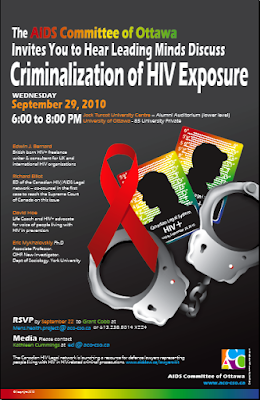Last week, a woman in Kamloops, BC, arrested for drunkenness and who subsequently engaged in consensual lesbian sex with a fellow prisoner (revealed 10 days later as being HIV-positive) – and who were watched by seven members of the Royal Canadian Mountain Police – filed a lawsuit in the British Columbia Supreme Court seeking damages from the provincial and federal governments, the City of Kamloops, the seven policemen and the woman with HIV.
Now, journalist Shawn Syms has written a great analysis of the case for Xtra West. Highlights below and full text at Xtra.ca.
Describing herself as “horrified and scared and mad,” the woman told the Kamloops Daily News that she feared for her health: “It was the worst thing in the world that could have possibly happened to me. Every day is a struggle.”Her legal advisor, Victoria personal-injury lawyer Erik Magraken, told the paper, “This is all about the duty to protect. If the RCMP has someone in their custody, they have a duty to protect that individual from harm. If harm comes from ignoring that duty, damages can follow.”According to Cecile Kazatchkine, senior policy analyst with the Canadian HIV/AIDS Legal Network, this is the first time to her knowledge that HIV non-disclosure has been implicated in a legal case involving lesbian sex.Contacted by Xtra, Magraken refused to specify if the harm he was referring to is, in fact, HIV. He says he’s speaking “very generally” to the notion of “any kind of harm.” But according to the Daily News, Magraken did argue that “if they fail to disclose they have HIV, that is an aggravated assault and there can be no consent in those circumstances.”Well yes, criminal charges have been been laid on that basis more than once, but what’s been affirmed by the courts is slightly different. To date, we know that HIV disclosure is required in instances where there is actually a serious risk of grevious bodily harm. (BC Crown spokesperson Neil MacKenzie told Xtra the police have submitted an investigative file on the case, but there has been no decision yet as to whether any charges will be laid, or against whom.)The thing is, there’s a difference between serious risk and virtually no risk. Health Canada describes the risk of woman-to-woman HIV transmission as “unlikely,” and after more than two decades of tracking, the Centres for Disease Control in the US have no confirmed cases of lesbian HIV transmission in their databases.Lesbian AIDS advocate Cindy Patton famously encapsulated safer-sex strategies back in the 1980s in this way: “Don’t get semen in your anus or vagina.” Since neither woman in this case has been identified as trans, we can probably assume that this risk did not come into play.The case “shows how much fear, prejudice and ignorance around HIV and the risks of transmission can easily divert people’s attention from what really matters – the issue of people’s security and privacy while in custody,” says Kazatchkine.She points to a BC Supreme Court case from 2003 where a woman was awarded $15,000 in damages after being stuck with a syringe in a cab in Vancouver’s Downtown Eastside. In that case, the plaintiff claimed she was plagued with fear of becoming HIV-positive for seven years after the incident, which is not medically plausible unless she subsequently got HIV from some other activity.[…]
We can be fairly certain no HIV was transmitted in the jail cell that night. If the RCMP’s original account is any indication, it appears two people who were equally willing – and equally intoxicated – engaged in erotic play, that neither took undue advantage of the other, and no one was genuinely placed at significant risk of any harm as a result of their tryst.



